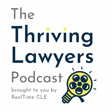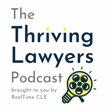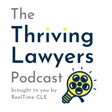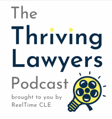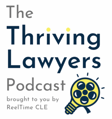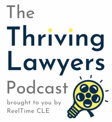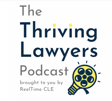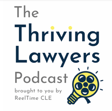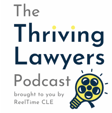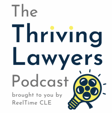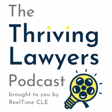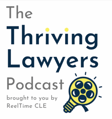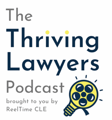Become a Creator today!Start creating today - Share your story with the world!
Start for free
00:00:00
00:00:01

Katherine Adamenko, Ropes & Gray-- Winning with Well-Being in BigLaw
Join Michael Kahn for an informative and lively interview with Katherine Adamenko, the Manager of Well-being for Ropes & Gray, an international law firm with 1400 lawyers.
Transcript
Confessing Anxiety at Work
00:00:04
Speaker
Nobody wants to talk about mental health at work, right? And I just finally looked at her and just said, I have anxiety. And it just, it was so great because I was role modeling, you know, as a wellbeing expert. And here I am as a coach, you know, I spent thousands of sessions with folks openly talking about their struggles in
00:00:30
Speaker
Not just saying mental health because I'm not a counselor, but you know, around struggles and obstacles and everything. And I opened my mouth, especially as I have anxiety. And I was like, wow, I just said it out loud. Like it's very different to talk about it with your partner or your therapist, but it's very different to talk about it to your director. But then I said to her, I'm taking care of it. I'm working on it. And she gets good. And that was it.
Episode Introduction
00:00:58
Speaker
Welcome back to The Thriving Lawyers Podcast. In this week's episode, join Michael Kahn for an informative and lively interview with Catherine Adamenko, the manager of well-being for Ropes & Grey, an international law firm with 1,400 lawyers. Welcome back to The Thriving Lawyers Podcast. This is Michael Kahn. I am
00:01:20
Speaker
one-half of real-time creative learning experiences. Chris Osborne, who is a practicing lawyer, is the other half. I am a former lawyer and a licensed professional counselor and a LAP counselor as well, Lawyer's Assistance Program counselor. So today we have a wonderful person and also a
00:01:49
Speaker
Aside from being a wonderful human being, Catherine Adamenko is the manager of Wellbeing for Ropes and Gray, which is a law firm in, I think they have multiple offices, but she is in the New York office. And she does, wears many hats for them.
00:02:09
Speaker
is responsible for their wellbeing strategies. We'll talk more about the wellbeing and diversity initiative that she is doing with a colleague there and many other things. And her background actually is not as a lawyer, but as it says in her bio, veteran of the fitness and wellness industry. So we'll talk to her about that as well. Catherine, welcome.
00:02:37
Speaker
Thank you so much for having me. It's a real honor to be here. Well, we've had some great conversations offline, so I'm excited and confident that this is gonna be really interesting for our listeners. So Katherine, I wanna just start out and ask you to describe what the manager of wellbeing
00:03:03
Speaker
what your responsibilities are, what that actually means for a law firm. And then I'm sure I'll have some specific questions to ask you about that once we hear your initial description.
Global Well-being Strategy
00:03:19
Speaker
Sure. It's interesting. I think it's a little different for each of the big law firms. It's been a fascinating
00:03:32
Speaker
It's been fascinating to watch the kinds of people and where they sit in a firm. Here at Ropes and Gray, I'm the first one of its kind as the manager of well-being. And the mission to bring me on was really about globalizing the well-being strategy. We have six offices in the US. We have four in Asia and one in the UK.
00:04:02
Speaker
And we had wonderful local wellness and well-being programs going on for a very long time, over half a decade. Some of the races and challenges people had been running at the firm probably over a decade. But there was no cohesive overall strategy. And one of the most important reasons also why I was brought on in the middle of 2019
Industry Report's Influence
00:04:33
Speaker
is we wanted to be part of the bigger lawyer wellbeing movement that really took off about a year prior throughout the legal industry. And so my role- Was that the, sorry for interrupting Catherine, but was that for the task force, the wellbeing task force when that report came out? Yep, that very industry changing report that came out. And then there were a number of public articles that came out talking about
00:05:02
Speaker
the mental health, the crisis of mental health and well-being in the industry. So it was a real moment of intervention. And we wanted to be a leader. And so that's how ropes found me. And I found ropes. And one of the other reasons that I was brought on is that I come, as you mentioned, I come from the fitness and wellness industries. But at the time, I'd spent seven solid years in well-being programming, really,
00:05:32
Speaker
helping to build programs from the ground up. Yeah, and it was with, I think, American Express was one of the companies you work for. So that's not a small responsibility there to be responsible for wellness for such a large company as American Express. I really got my experience at Asina Retail and Dress Barn.
00:06:01
Speaker
That's a big company as well, right? Yeah, no longer, unfortunately, but one of the best places, culturally one of the best places I've ever worked for sure. They had a real commitment and it's pretty groundbreaking. This was back in 2012. It's a real commitment to well-being, you mean? Yeah, it was a vision for the vice president of HR at the time was really committed.
00:06:25
Speaker
to bringing the, at the time, the company itself kind of into that, the wellbeing world. So how did a law firm find you since you were not a former lawyer or you didn't work in law firms? How did that happen? LinkedIn. It's a good promo for LinkedIn. All right.
00:06:53
Speaker
Wow. So, so just, uh, you were, you just thought, and well, I guess I'll ask you then what, okay, they found you, but then what did you think, uh, how did you imagine that going to a law firm would work for you since you hadn't had any experience working at law firms?
Corporate Shift: Wellness to Well-being
00:07:15
Speaker
Yeah, it was really fascinating. I had also been recruited by another law firm for a very similar role and had already gone through the whole interview process. So it was a little bit familiar as well. But what really did it is making the shift from wellness to well-being. And that's slowly happening. And even in 2019, companies and corporations weren't quite there yet.
00:07:45
Speaker
And it was very specific of the shift from wellness to wellbeing that piqued my interest. Um, then the, I was believing it or not. So it's an interesting, um, evolution. So that was one thing. And then the, and what's the difference by the way, between wellness and wellbeing. So wellness tends to be on the physical,
00:08:14
Speaker
uh, health side of things, right? You can see that from the, you look at health and wellness centers. It's around lifestyle coaching, eating. I always like to use eating while moving more sleeping, soundly, right. And, and, and, and stressing less and things, traditional wellness, uh, programs for things like flu shots and mammograms and a nutritional lunch and learn and maybe a step challenge.
00:08:41
Speaker
But the piece that was separate in particular was the mental health and emotional wellbeing, as well as things on the more HR side of things like social community involvement, social wellbeing, career wellbeing, financial wellbeing. And so it's a much more holistic approach.
00:09:07
Speaker
Yeah, it's kind of like, and folks, this is audio, so I can't show this to you, but like the graph that they have or the graphic that they have in the wellness report of the six different areas that define thriving. And you mentioned a few of them right there. So I took you away from your, I interrupted you talking about going from
00:09:34
Speaker
from wellness to wellbeing. I think we were talking about how you envisioned yourself working for a law firm. Yeah. And so, you know, I already have like some of that experience under my belt of interviewing at another big law firm, um, and a little bit understanding a little bit more of what it would encompass at a firm. But then I did a little digging around and two things happened. Is it kind of a coincidental,
00:10:00
Speaker
The first was I did a little research on the lawyer well-being report itself and saw that one of its architects, Anne Bradford, was a graduate of the positive psychology program at UPenn under Martin Seligman. And I had been spending the last 10 years as my personal project
00:10:23
Speaker
a personal passion project, researching positive psychology and reading everything I could and doing all the practices and learning all about it. So it was already grounded in philosophy and practice that I was not only passionate about, but was doing myself. And then it was... Oh, go ahead. I'm sorry. Oh, no, go ahead. No, finish. Finish, Catherine.
00:10:48
Speaker
And then the other piece is I was at Passover, a Passover family dinner, and I was sharing that I had this upcoming interview with a cousin who is a lawyer in big law at another firm, and she had just shared the article that had come out of big law killed my husband. Oh, yes. Yeah, which had- It was at the Sidley Austin lawyer.
00:11:18
Speaker
It had a profound impact on me. And, you know, and she shared, we had a very frank conversation, and she shared a little bit more kind of, kind of the life of a lawyer. And so between that, and then, of course, when I interviewed at Robeson Grey, I also did a little, right before the interview, I did research about their pro bono program, and they support
00:11:46
Speaker
so much of the organizations, they work for around LGBTQ, immigration, social justice, like having duty work. And I started putting the pieces together and I'm like, where can I serve? What, you know, in a way that I could bring my own philosophy that's gonna be welcome in the lawyer wellbeing world,
00:12:15
Speaker
And then, of course, the culture was the right fit. Yeah, that's so important, and just to go off on a slight tangent. But in my role as a lawyer assistance program counselor, I often will talk to lawyers who are unhappy in their, not often, but it's not unusual to talk to lawyers who are unhappy in their current role, not as being lawyers necessarily, but either in the law firm or the organization.
00:12:45
Speaker
where they're working. And I often talk with them about how important the values fit is. And if you don't have, and for some of them, that's, there's a disconnect. Their values, I'm not saying that where the place where they're working is unethical or somehow bad place in general, but for that person, there's a disconnect.
00:13:13
Speaker
And it sounds like for you, that was one of the draws for you with Ropes Grey was that there was a values connect, that it was consistent. What they were doing was consistent with some of your values. Yeah, exactly. Okay. So I'm curious, was there any difficulty for you not being a lawyer once you started working there? Did that present
00:13:42
Speaker
anything any obstacles for you because That can be for sometimes lawyers can be you know, if you're not a lawyer You don't understand my world They can I've noticed that in the I do a lot of Chris and I do a lot of CLE programs and fortunately I'm a former lawyer so that helps but Not being a lawyer sometimes can be it can take a little while for lawyers to warm up to you if you're presenting CLE it was that an obstacle for you at all
00:14:13
Speaker
It was, yes. I'll say my first six months. Yes. And I'll share something really interesting of how I overcame it in two ways. The first is I was really fortunate myself, because of my fitness training and also my training and as a wellness coach, as a practitioner, I knew all about
00:14:37
Speaker
working with different personality types. I forget the, the four box, you know, um, there's that, uh, four box theory and that you could be like direct and social or indirect. And so you get to know, and I did a lot like address bar and we did a lot of those kinds of personality assessments. So I was already armed with a little bit more emotional intelligence coming in.
00:15:06
Speaker
And believe it or not, even as a group fitness instructor, which shows a group fitness instructor for 10 years, I had some, I worked at some of the best clubs you could imagine. And we had some serious training about how to teach to all different personality types. So I transferred that knowledge of working with lawyers who are in like that top left
00:15:31
Speaker
box of direct and informational. Lawyers like to be direct, armed with data and information. And I'm the opposite box. Draw the opposite diagonal line. Right. Yeah. So that was one thing. I came in with it. However, having the knowledge is different than the practice, but I was coached by my director. And there were some difficult conversations
00:16:00
Speaker
Some of it was a little bit more lighthearted, like I'm in the middle of a presentation to two leaders and they stopped on like the second slide and pointed out I was missing a colon or a period or something. And then I was told I need to get used to it. And so I upped my editing skills. Right. That's funny. And then the other type is also
00:16:25
Speaker
you know, learning how to be yourself, right? But also how to fit in in a sense of what you're saying and what you do is going to get across. And that's something again, as part of my wellness coach, my training as a wellness coach. But the other big piece of how I also overcame the obstacle, I started finding avenues where my personality really could shine through in things like
00:16:52
Speaker
teaching and teaching yoga classes and giving practical presentations where those are the most important skills. So I had to really practice some of the, the, the kind of more harder skills, you know, maybe toning it down at meetings and listening more and, you know, being a little bit more formal and then using that, the, the, my strengths kind of in my own personality wheelhouse to do the things that like a wellnessy person does.
00:17:22
Speaker
Yeah, that's a good point. I remember I did some consulting and worked with some high-level corporate leaders for a company, and I wasn't doing it myself. I was doing it with a team of folks, and I am such an informal
00:17:43
Speaker
Pretty laid back person. What? No. I didn't get that at all. I know you're shocked by that. So that was one of my challenges, actually, to go into that setting and be more formal. I couldn't just go in and be, you know, they say be yourself, which is true. You don't want to change who you are, but I had to go in and be more formal.
00:18:09
Speaker
And it was a real challenge for me to, to, and it sounded like for you that that's, I think what you said is you had to, you didn't change who you were, of course, because who you are is, is so important in the, in your role. You're very, uh, vivacious and high energy and passionate. And that's so important. And you needed to modulate that at times, depending on who you were in front of, right?
00:18:35
Speaker
I think everybody does. I think that's part of what emotional intelligence is all about. I was just on a bigger learning curve and then also, excuse me, also I was coming into a global role for the first time. A true global role with some big expectations and like programming already set to go. I was gonna throw it into the fire as well and so I had a newer role
00:19:03
Speaker
And even though I was a manager for many already a program manager for many years being a manager ropes and gray Was it a bit of a different level like out in the real world? It would have been like a senior level So I really had to skill up in that sense of really owning what a manager is And there is a little bit more of an element of formality, but I also really appreciated it because I now have better listening skills and
00:19:33
Speaker
Outside of coaching, right? It's very different as a wellness coach, kind of like when you're, it's almost like the podcast you're doing now, right? You know, it's a little bit different. Just with interactions, for example, at meetings, I've learned how to listen more, have more, better crisp execution, meeting recaps, follow ups. And I see when I don't do these things,
00:19:58
Speaker
Um, there's a little bit of bleeding in there. And also of course you want to be taken seriously. So you don't want to be too loosey goosey. Like it's interesting seeing the different vendor, like having, you know, we've had some experts come in and seeing the ones who understand that a little bit better than others and how they're received, right. And how they're talked about after, um, did something, oh, go ahead.
00:20:27
Speaker
Well, I was just going to ask you, as being a female, was that, and I know it was in a role as a wellness person, so maybe there's more expectation that's going to be a female in that role. But did you find that being a female was a challenge at all in terms of being respected by some of the folks you worked with there, particularly those in leadership?
00:20:57
Speaker
Oh God, no, not a problem. Yeah, gender. Yeah. Ropes and they're, you know, it's interesting. It's not as much, it can look like the wellbeing and wellness can look like a woman's world, but it isn't. And it also isn't in law firms, right? Some of the,
00:21:15
Speaker
The leaders of, you know, the wellbeing leaders that are the firms are men as well. I welcome it because it can be a bit of a, I've worked for many women in women's circles, especially HR, but no, never had that impact at all. Okay. Well, that's good to hear.
Managing Anxiety in a Global Role
00:21:34
Speaker
So just personally, I want to ask you more of a personal question again. So that sounds like,
00:21:43
Speaker
I'm anxious even hearing what it may have been like for you to jump into this job at a law firm. You've never worked at a law firm. And like you said, this is a global initiative that you jumped into. How were you able to keep your feet on the ground, stay centered
00:22:08
Speaker
deal with stress, anxiety, the pressure. What worked for you back then? Well, I'll tell you, anxiety got the best of me. That was for sure. Yeah, it really got the best of me. There's moments you think, did I get in over my head? It was a lot of it was culturally, do I fit in? Will I ever fit in?
00:22:34
Speaker
Am I, you know, is this something that, you know, but the two things, there are three things that I did. The first was, you know, I'd have these one on ones with my director and she explained it that onboarding at ropes is just, you know, there's, it's a place, it's one of the best law firms in the world with high expectations. And so you're going to have to learn more about those expectations. So you're going to climb up the hill and you're going to get to a plateau and you're going to be like, Oh,
00:23:03
Speaker
I got it. I can do that. I get it. And then something, you know, time's going to go on and there you are. Boom. Another big hill. And you're going to go on that hill. And I've gone up a whole number of them. Right. It's such a great feeling. So that was some of the best coaching that I got from my director as well. And then I sought help. I was going through this massive amount of anxiety. I had an experience in a really long time. So I got the help that I needed.
00:23:35
Speaker
That was one thing. And I really, you know, I saw, um, I had been seeing a therapist, but then I, I, I specifically focused around this and we, we did a lot of work around it. So I got, I did a very focused kind of problem solving around it. And then a lot of self care. I did a lot of self care. You know, my sleep was being disrupted.
00:24:00
Speaker
I was feeling a mess. And so I had to really make a concerted effort to really focus on sleep hygiene, you know, all the habits around sleep, really take positive action. If I couldn't sleep, find it was a lot of like CBT, cognitive behavioral therapy techniques, right, about the ways in which I'm thinking and approaching my work, making sure I was eating well and relaxing and spending time with friends and, you know,
00:24:27
Speaker
And then, of course, I had this big initiative that happened and it was a success. And then I'm like, what was all of that crazy worry about, right? Yeah. Well, I actually repeat myself probably to clients and to folks in workshop audiences.
00:24:47
Speaker
And maybe even have said this in one of the podcasts, but I'll say it again. One of my favorite quotes is Mark Twain's quote that hopefully I have, right? He said, I've had many worries in my life. Most of them have never happened. Yeah. So that's so true that most of the stuff we worry about doesn't happen. But to just to highlight what you said, because I think this is really important for
00:25:16
Speaker
our listeners to hear, and this is something we hammer home on this podcast. In fact, it's called the Thriving Lawyers, plural, lawyers, not lawyer, podcast, because our focus is on the importance of, well being of course, but the importance of community. And so you said, first thing you said was you had a mentor.
00:25:43
Speaker
maybe this was your boss as well, but a mentor who you could go to, who could give you some guidance, and then you went to a therapist. So you had two, recruited two folks to help you, and then self-care and sleep, sleep hygiene, as you said. And you mentioned cognitive behavioral, because you said when you first started answering the question, one of the negative thoughts you had was,
00:26:12
Speaker
I don't know if I can do this. Or who am I to think I can do this? I don't know if you actually thought something like that. But similar kinds of thoughts, right? Have I taken on too much? And it's important that we respond to those thoughts. Now, of course, you had success, so now you have that. Because if that negative thought comes back, you can look back and you can identify the fact that you've had success now.
00:26:41
Speaker
And that's, of course, helpful. So what have you noticed? And did you answer that question fully, by the way? I just want to make sure, because it's OK. Yeah, I think the only other thing that I will add as well is that there was a meeting when I was going through this. Because my performance, my boss would get calls.
00:27:10
Speaker
I was making mistakes when you get anxious, so you're not at 100%. So it wasn't just that I wasn't sleeping. I wasn't working at the capacity that, of course, that I knew myself to be as a professional. And then my boss looked at me, and she's like, what's wrong? And without going into detail, and I think this is so important because nobody wants to talk about mental health at work. And I just finally looked at her and just said,
00:27:41
Speaker
I have anxiety. And it just, it was so great because I was role modeling. Yeah. And here I am as a coach, you know, I spent thousands of sessions with folks openly talking about their struggles and not necessarily mental health, because I'm not a counselor, but you know, around struggles and obstacles and everything. And I opened my mouth, especially as I have anxiety and
00:28:11
Speaker
I was like, wow, I just said it out loud. Like it's very different to talk about it with your partner, your therapist, but it's very different to talk about it to your director. But then I said to her, I'm taking care of it. I'm working on it. And she gets good. And that was it. Yeah. And it was, but to the credit of your director, they asked, right? Oh my God. Yes. Yes. Yes. Yeah. And remember, this is pre pandemic, but not, you know, this was in,
00:28:42
Speaker
November, I believe, of 2019, right? So, you know, I can only think now how easy, much easier it is, or hopefully easier it is for leaders to reach out, you know, to ask that question. You're talking about, you're talking about during, I was going to say post pandemic, but that's not true. No. And it won't be true when this podcast drops. No.
00:29:08
Speaker
You're talking about now during the pandemic, it's easier. It's maybe become more normalized to check in with folks and see how they're doing. Yeah, it was part of what we were giving leaders guidance on. It was the check-in. It was literally a check-in, you know, making sure they're checking in with their people. And, you know, as we kind of return to the office, it's still part of that. You know, it doesn't matter. Now it's even it could even be more impactful if it's in person. Right. So.
00:29:38
Speaker
Interesting. Yeah, yeah. I mean, I'm sorry, I was gonna say maybe. Yeah, sure. I'm gonna qualify that because if there's one thing that works virtually, it's been video therapy or like video check-ins. Yes. Right? Yeah. So I'm gonna qualify that. I think that's the one area whether you can check in with someone face to face or virtually with a camera. I still, I'm gonna, I'm gonna,
00:30:07
Speaker
make sure I qualify. You're saying that's still effective to check in virtually. Totally. Yeah, I agree. All my counseling sessions since the beginning of COVID, I haven't done one in-the-room counseling session. They've all been either virtual or on the phone.
00:30:25
Speaker
Yeah. And they're very effective. This is not a podcast to talk about the downsides of that, but they're certainly downsides, but they can be as effective as in the room. And I want to just emphasize one other thing. The fact that I think you said, you said, I'm anxious out loud.
00:30:48
Speaker
and how much that helps just to say it out loud to someone. And in this case, someone you work for, which took, granted you were modeling something, but it still took some courage on your part to say it out loud, but it can be so relieving to first identify it and name it, but then to say it out loud to someone.
00:31:12
Speaker
Thanks for listening to this episode of the Thriving Lawyers Podcast. We love hearing from our loyal listeners, so please feel free to email us any questions, comments, suggested topics, or guest recommendations at the following address, feedback at thrivinglawyerspodcast.com.
00:31:27
Speaker
The Thriving Lawyers Podcast is brought to you by Real-Time Creative Learning Experiences, a national provider of continuing legal education and professional development programs that leave participants engaged, encouraged, and equipped to pursue meaningful and sustainable change in their practices, their lives, and the organizations they work in. And by Osborne Conflict Resolution, your experience guides through the uncharted terrain of business and family law disputes based out of Charlotte, North Carolina. Thanks for listening, and we'll see you next time on The Thriving Lawyers Podcast.
